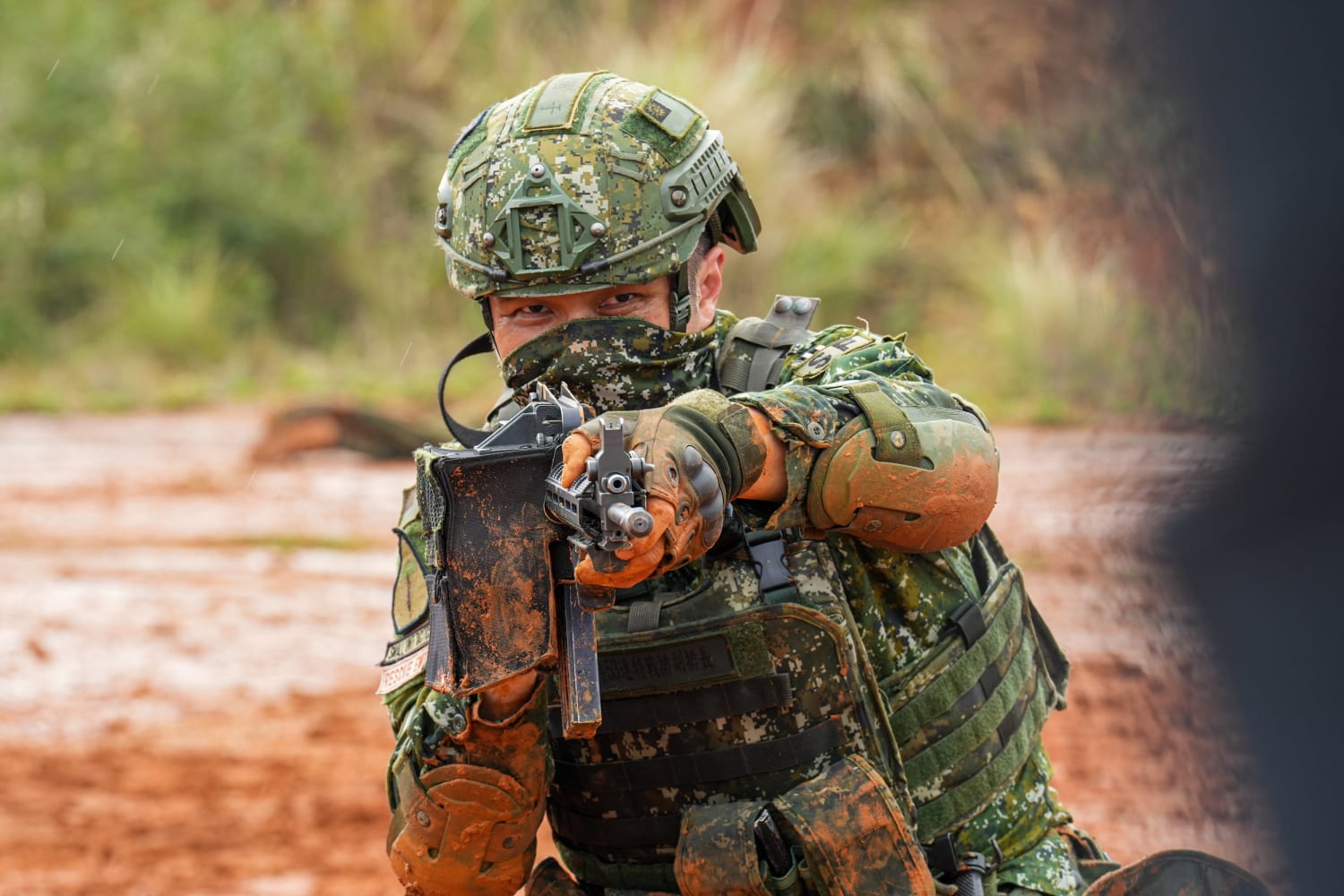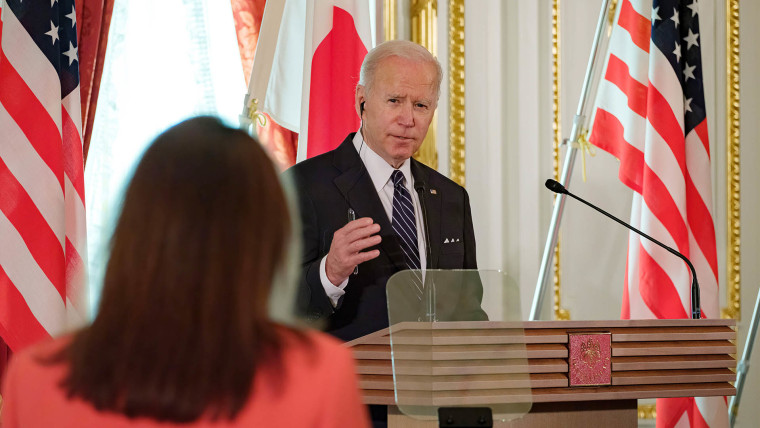Meeting with Asian allies in Tokyo on Monday, President Joe Biden said the United States was ready to intervene militarily on behalf of Taiwan should China attempt to seize the island by force — the most explicit commitment to protect the island articulated by a U.S. president, much as White House aides are now trying to suggest otherwise.
Can U.S. conventional military power really prevent China from capturing an island just 81 miles away from its shoreline but thousands of miles away from the United States?
Biden’s comments, made in response to a question from the media, come in the shadow of Russian President Vladimir Putin’s horrible invasion of Ukraine. Likely high on the mind of the U.S. leader is whether Beijing might one day assault Taiwan, and whether a far more wealthy and populous China can succeed where Putin failed.
The Chinese Communist Party would prefer a peaceful Hong Kong-style political assimilation, but it has developed military capabilities to seize the self-governed island by force as a Plan B. In recent years, Beijing’s air and naval forces have significantly increased patrols around Taiwan’s perimeter, driving home the threat of blockade and invasion should Taiwan persist in rejecting Beijing’s rule.
The People’s Republic of China has claimed Taiwan as its sovereign territory ever since China’s civil war, when the Kuomintang government decamped to the island in 1949 after being overthrown by the communists. Taiwan is now a prosperous democracy, and a large majority of Taiwanese reject reunification with China.
China will no doubt study Russia’s failed war in Ukraine to try to find ways to avoid Moscow’s mistakes, while Taiwan is learning important lessons on how best to defend itself. The U.S., too, should be assessing which of its methods in Ukraine could help Taiwan — and which wouldn’t — if Biden looks to make good on his words Monday.
Biden’s remarks went beyond Washington’s historically more ambiguous stance on whether it would defend Taiwan in the case of an invasion. Even though White House aides are trying to roll them back by saying they don’t represent a change in policy, the U.S. has always been more likely to defend Taiwan than Ukraine. The former Soviet republic has only recently moved toward becoming a U.S. ally, and is in a region seen as less central to Washington’s geopolitical concerns than the East Asian island.
In December, Biden made clear that he wouldn’t send U.S. troops to Ukraine, while his commitment Monday almost certainly would entail American deployments. Even if Washington only sought to send aid to Taiwan as it has with Ukraine, the U.S. and allies like Japan and Australia would have to overcome a certain Chinese blockade to get the material to Taiwan.
So if the U.S. follows through on promising to intervene, can Taiwan’s defenders stave off an attack long enough for U.S. reinforcements to arrive? And can U.S. conventional military power really prevent China from capturing an island just 81 miles away from its shoreline but thousands of miles away from the United States?
In the past, the answer to that last question was clearly “yes,” due to U.S. naval and air superiority. But China’s military has expanded and modernized greatly, and the U.S. ability to defeat it close to its borders can no longer be taken for granted. Taiwan’s people and military, therefore, need to be robust enough to withstand initial assaults and hold out for weeks before the U.S. and allies could respond with full force.
Taiwan starts with the advantages of being wealthier than Ukraine and operating many more advanced combat aircraft, warships and long-range missiles, spending as it does three to four times more on defense despite having a smaller population. Geographically, because Taiwan is an island, it’s only threatened from invasion by the smaller number of troops China can land there by sea and air.
But the greater disparity in population (roughly 60:1) and military power between Taiwan and China is more unfavorable than Ukraine’s situation vis-a-vis Russia. And while a massive amphibious invasion would be a challenging undertaking, China’s military is capable of blockading the island and bombarding it with thousands of cruise and ballistic missiles. On balance, the intervention of U.S. air and sea power could only give Taiwan a fighting chance.
Beyond military power, Taiwan and the U.S. do have another source of deterrence: the economic and diplomatic pressure sure to be brought against China should it invade. Right now, Beijing is watching the U.S. and its Western allies impose crushing economic sanctions on Russia, causing massive inflation and a projected 15 percent contraction of its economy.
But China has also observed that many governments in Africa, Latin America, the Middle East and Asia haven’t joined in. These are countries where China and Russia’s levers of influence often exceed that of the U.S. or Europe — China’s even more than Russia. Ambiguity regarding Taiwan’s sovereignty will also make it easier for the international community to avoid taking sides.
Still, Beijing has been given an object lesson in the hubris of betting on the kind of “short, victorious war” Russia apparently thought it could deliver. China’s military has both quantitative and technical advantages over Russia’s, particularly in the air and at sea. However, it’s had almost no combat experience since a short war with Vietnam in 1979, while Russian troops have seen action in Afghanistan, Chechnya, Georgia, Syria and Ukraine. And Chinese military exercises remain highly scripted and unrealistic.
That said, Chinese military thinkers are keenly aware that their own military might be prone to similar flaws as Russia’s, and the country has more resources to try and correct them — though such institutional shortcomings are challenging to overcome. Moscow, for instance, implemented reforms responding to underperformance in its recent conflicts, but evidently not enough.
Against this backdrop, Ukraine has offered specific military case studies to Taiwan. Encouragingly, Kyiv managed to sink a powerful-though-dated Russian flagship with just a few missiles from land-based launchers. While modern U.S. and Chinese warships undoubtedly have much better air defenses, we don’t know how well they would work, as most have never been tested in combat. This is good news for Taiwan, which has long been investing in anti-ship missiles on trucks and small boats that are inexpensive yet difficult to locate and therefore destroy.
On ground and in the air, the unexpected resilience of Ukraine’s surface-to-air defenses and planes despite Russia’s much larger air force also suggests Taiwan’s might do better than expected if it smartly prioritizes long-term survival. That said, Taiwan is a fraction of the landmass of Ukraine and thus easy for China to blanket with surveillance. China also has far greater economic resilience than Russia and can mass-produce the expensive long-range missiles Russia appears to be exhausting.
Even if Washington only sought to send aid to Taiwan as it has with Ukraine, the U.S. and allies like Japan and Australia would have to overcome a certain Chinese blockade to get the material to Taiwan.
Furthermore, China’s People’s Liberation Army has historically been more tolerant of casualty-intensive strategies. For example, the PLA Navy could tap hundreds of unprotected civilian ships to expand its logistics and swamp Taiwan’s coastal defenses, even if that comes at great cost to civilian sailors.
What protects Taiwan — its island location — also makes it vulnerable. It doesn’t have a secure land border to receive military assistance, thus the aid to Taiwan would ideally be delivered before any Chinese attack. The U.S. needs to stop dragging its feet and more promptly authorize sales of heavier weapons like tanks, jet fighters, artillery and surface-to-air missiles to Taiwan, which take too long to properly integrate last-minute.
In the meantime, Taiwan should double down on mobile land-based anti-ship, surface-to-air missiles and targeting radars, all cost-efficient counters to expensive warships and aircraft. Taiwan should still also purchase cheaper, more expendable combat drones while developing defenses against the same. By contrast, Taipei should deprioritize the construction of expensive surface warships they are now building that can potentially be lost quite rapidly, as happened to Ukraine’s few ships.
But the most important steps that Taipei and Washington can take are those that persuade China never to exercise its military option — something Biden couldn’t convince Putin of. That may involve balancing the benefits of overt defensive measures and alliance-building with incentives to convince Beijing an effectively independent Taiwan is more tolerable than the cost of seizing it militarily.
Source: | This article originally belongs to Nbcnews.com











